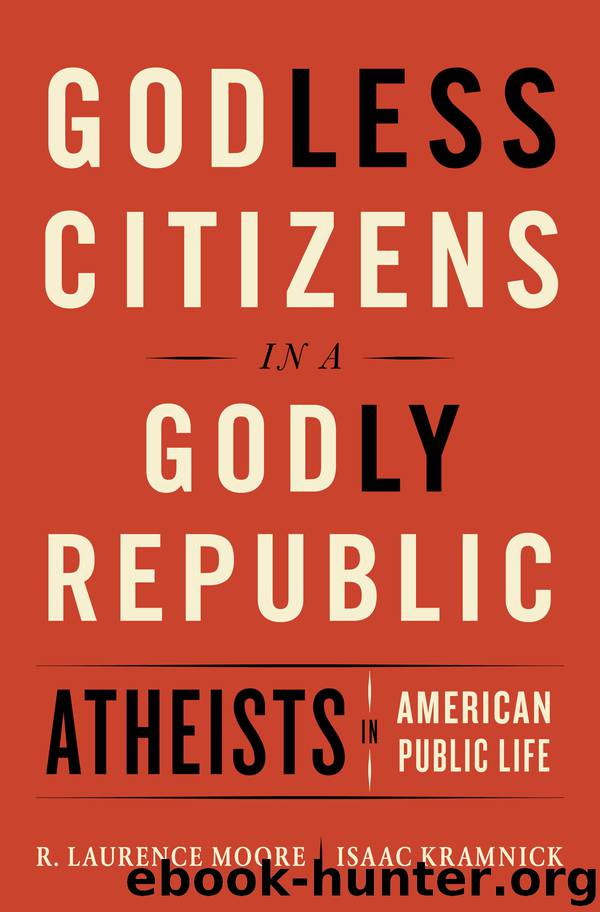Godless Citizens in a Godly Republic by Isaac Kramnick

Author:Isaac Kramnick
Language: eng
Format: epub
Publisher: W. W. Norton & Company
Published: 2018-08-01T16:00:00+00:00
7
Unequal Citizens Under God
EVEN IF FEDERAL and state court justices are right in thinking that the phrases “one nation under God” and “in God we trust” aren’t usually intended as bullying cries to coerce nontheists into conformity with a theist majority, all laws that seem to endorse the principle that the United States is a religious nation effectively exclude nonbelievers from equal participation in many public ceremonies. The fiction of a religious nation has other consequences as well. In this chapter we trace the way in which it has allowed beliefs and actions based on the supposed commands of an Almighty God to carry more weight than the beliefs and actions based on nontheistic moral principles. The specific legal question is whether a constitutional interpretation of free religious practice may justify for theists, but not for others, an exemption from general laws that on their face have nothing to do with religion.
In the past fifty years, no issue has led to more division on the Supreme Court than the issue of what protection extends to a religious practice when it is not specifically part of a religious service but tied to how people conduct their nonchurch life in a quotidian world ruled by general laws passed not by religious bodies but by secular legislatures. The protection of free religious practice does not permit all behavior that might be religiously motivated. But the lines aren’t clear. A man who claims that God has ordered him to drive one hundred miles per hour on an interstate highway is not likely to get very far in court. But the same man who says that God has forbidden him to prepare a cake for a gay wedding, even though a state law prohibits a business from discrimination based on sexual orientation, may do better. Such a case involving a Colorado baker has made its way to the Supreme Court.
The idea of a “religious” exemption extends back to colonial America. As we saw in chapter one, colonial legislatures, acting in accord with then prevalent notions of religious “toleration,” exempted “religious dissenters” from the obligation to support the legally established church. The exemption allowed them to set up their own churches and to divert tax money collected to maintain the “established” religion to benefit their own institutions. There were other sorts of exemptions. One allowed Quakers to testify in court proceedings without swearing an oath. Another exempted Baptists from paying religious taxes altogether.
In the beginning none of these measures rested on a constitutional guarantee of free religious practice but on legislative enactments. The exemptions were quite particular about what was allowed and what was not allowed. The rights that a legislature granted could be taken away and sometimes were. By the late eighteenth century, most colonies had constitutions guaranteeing free religious practice, but again, as we saw in chapter one, the scope of free religious practice didn’t create a level playing field even for all religious denominations, let alone for nonbelievers. Members of minority religious sects
Download
This site does not store any files on its server. We only index and link to content provided by other sites. Please contact the content providers to delete copyright contents if any and email us, we'll remove relevant links or contents immediately.
Day by Elie Wiesel(2779)
The Age of Genius by A. C. Grayling(2584)
Gideon's Spies: The Secret History of the Mossad by Gordon Thomas(2337)
The Gulag Archipelago (Vintage Classics) by Aleksandr Solzhenitsyn(2096)
FATWA: Hunted in America by Pamela Geller(2008)
Columbine by Dave Cullen(1863)
Men Explain Things to Me by Rebecca Solnit(1724)
The Rule of Law by Bingham Tom(1690)
Anatomy of Injustice by Raymond Bonner(1656)
Examples & Explanations: Administrative Law by William F. Funk & Richard H. Seamon(1640)
Three Cups of Tea by Greg Mortenson(1613)
The Source by James A. Michener(1602)
That Every Man Be Armed by Stephen P. Halbrook(1577)
ADHD on Trial by Michael Gordon(1573)
Future Design by Unknown(1566)
Gideon's Spies by Gordon Thomas(1500)
Palestinian Walks by Raja Shehadeh(1494)
Constitutional Theory by Carl Schmitt(1451)
Nothing to Envy by Barbara Demick(1445)
